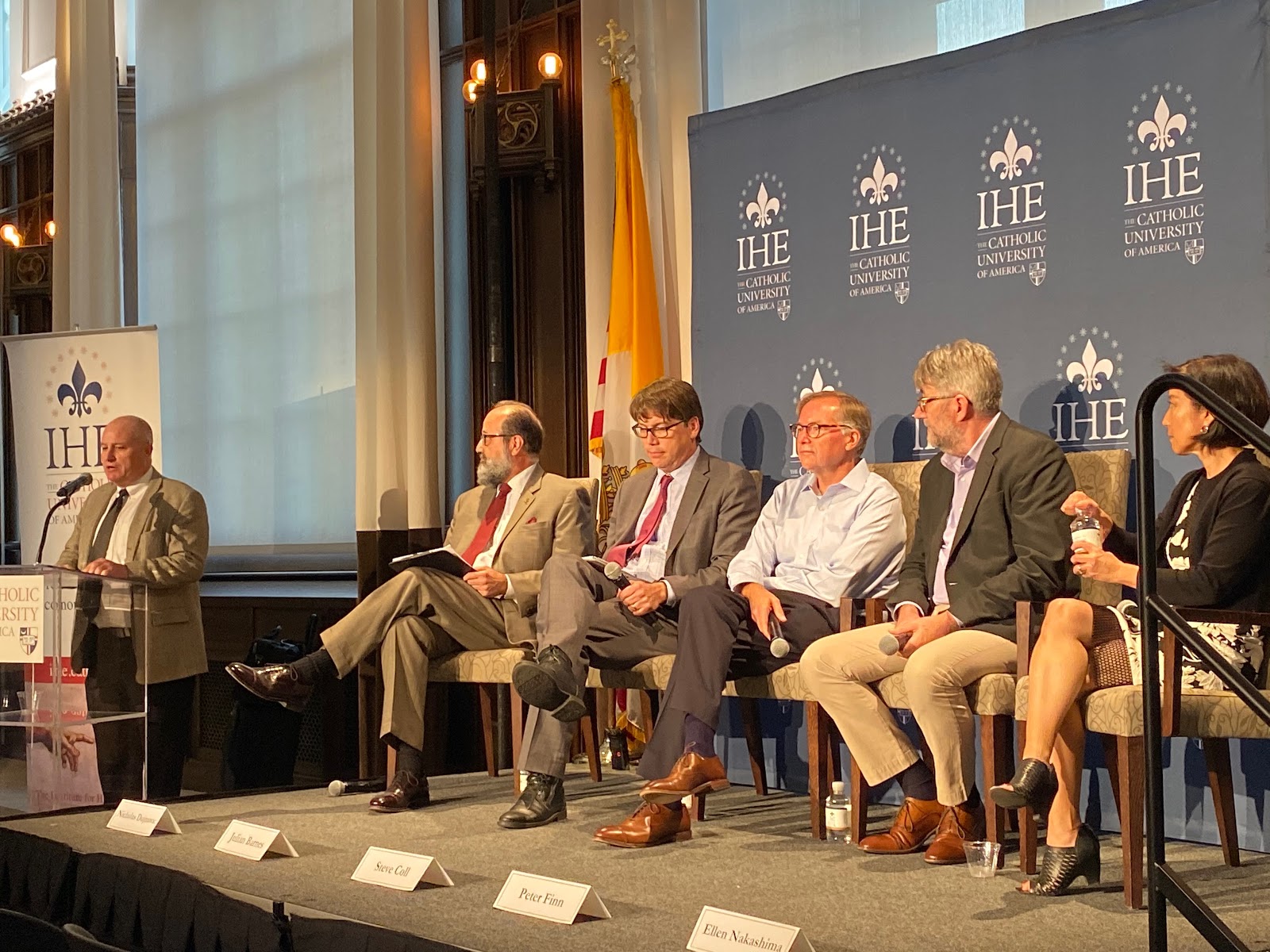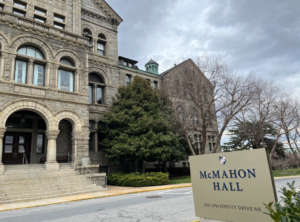Media and Intelligence Accountability

By Theresa Whitfield
Catholic University’s intelligence program and the Institute for Human Ecology co-hosted an event titled “Media and Intelligence Accountability” on Tuesday night in Heritage Hall. The event featured a panel of four journalists moderated by CUA professor and head of the intelligence program, Nicholas Dujmovic.
Dujmovic began the night with a brief description of the intelligence certificate program at Catholic and its specific focus on American intelligence. One of the main topics the program examines is to what extent U.S. intel activities are in accordance with American values. A common motif throughout the event was that U.S. intelligence activities have to be held accountable to the American people, and it is the job of journalists to keep the people well informed.
The event featured a group of renowned journalists spanning across various news outlets and areas of expertise.
Julian Barnes covers National and security issues for the New York Times, most recently reporting on the Intelligence Community (IC) whistleblower complaint. He has an extensive background specializing in U.S. military and national security topics for more than seventeen years.
Steve Coll is the current dean of Columbia University’s School of Journalism. He spent twenty years at the Washington Post as a correspondent and ultimately, managing editor. Currently, he is also a staff writer for the New Yorker, and a winner of two Pulitzer prizes.
Peter Finn is the national security editor at the Washington Post. For a period of time, he was also embedded with U.S. Special Forces during the invasion of Iraq. He has reported in sixty countries and is a Pulitzer Prize winner, according to this bio on the Washington Post website.
Ellen Nakashima reports on national security for the Washington Post and has a background in various national security aspects including intelligence, counter intelligence, and cyber. She is also a Pulitzer prize winner and has reported, along with Finn, on the Snowden leaks.
The panelists discussed a range of topics such as how the media should report intel, how they decide what should be shared, and competition between news outlets. They also delved into specific cases they reported on such as the controversial IC whistleblower complaint, and the recently discovered U.S. citizen spying for China.
Many students from Catholic attended the event, as well as free lance journalists and interested members of the public. There were approximately 80 people in attendance. Dujmovic led the moderated panel for about an hour and ten minutes before opening the last twenty minutes to the audience to ask questions.
A notable question posed by Dujmovic examined if the media should be limited to “information, neutral, reactive reporting and less investigative work.” Nakashima commented that it is important to report on what has actually happened, but it is also important to get at “larger, deeper trends beyond what the U.S. government puts out.” She explained her stance further by highlighting her investigative discovery of the U.S. citizen spying for China. The U.S. has paid vigilant attention to the idea of the Chinese sending spies, and it is important for journalists to know if the government is handling this possibility in a balanced way.
“It is important to make sure there is a balancing act on the part of the U.S. government between surfacing national security threats and undertaking a national campaign against the Chinese,” said Nakashima.
Another hot topic of the night was the question of how much the public should know. It is an interesting shift of power that the media largely decides how much information the public will know, and not the government. The panelists explained that with each new piece of information, methods of “consultation and deliberation” exist with correspondents in the newsroom as well as representatives from the part of the government that will be affected. How every new investigative finding is treated on a case by case basis. However, information should not be shared that could endanger one’s life or might cause harm to an ongoing operation.
While discussing this topic, the investigations of the IC whistleblower arose. Recently, the New York Times revealed that the whistleblower worked for the CIA, had previous White House experience, and expertise on Ukrainian policies. Very few people fit this description, and the publication’s controversial choice potentially put the whistleblower’s life at risk.
Barnes jumped in to answer this question and explained that while it is was controversial choice, it was one that was “not done lightly.” He explained that after the July 25th phone call, a CIA officer anonymously brought a complaint to the top lawyer at the CIA, and under CIA protocol, that lawyer called the White House. This meant that two weeks before the whistleblower complaint was filed, the White House knew it was coming. The aftermath of the complaint entering what Barnes called “a legal purgatory at the Justice Department ” is critical to understanding how the government anticipated the whistleblower case.
“I don’t think that the public is as well informed on the origins, about the seriousness, about the credibility of this person if they don’t understand that full story,” said Barnes.
Ultimately, this event highlighted the importance of the media’s coverage of intelligence. The competition between the various news outlets demands investigative journalists push each other towards the truth and print only their best work for the American people. Their role in reporting U.S. intelligence activities is vital to the interest of all U.S. citizens.







